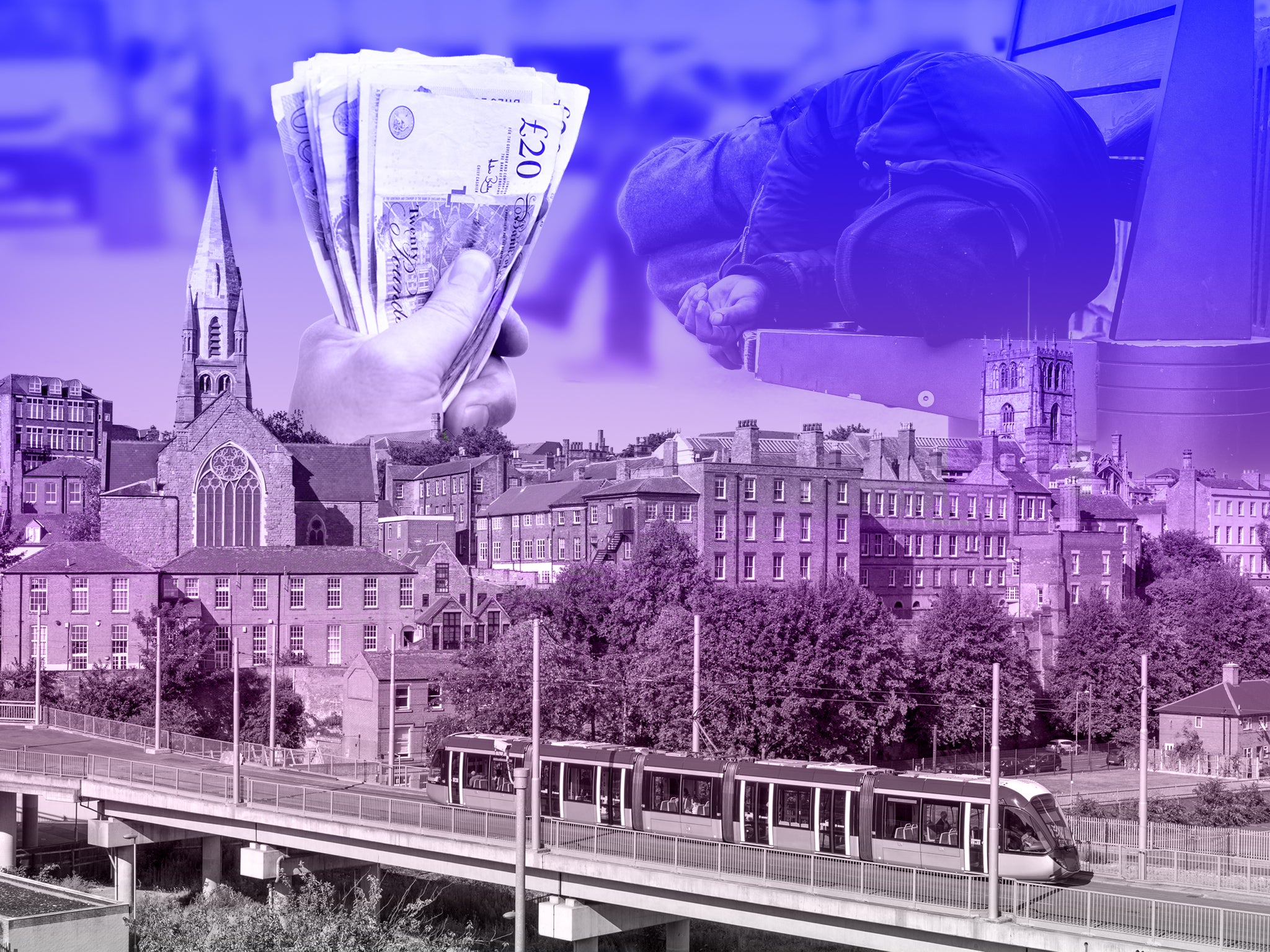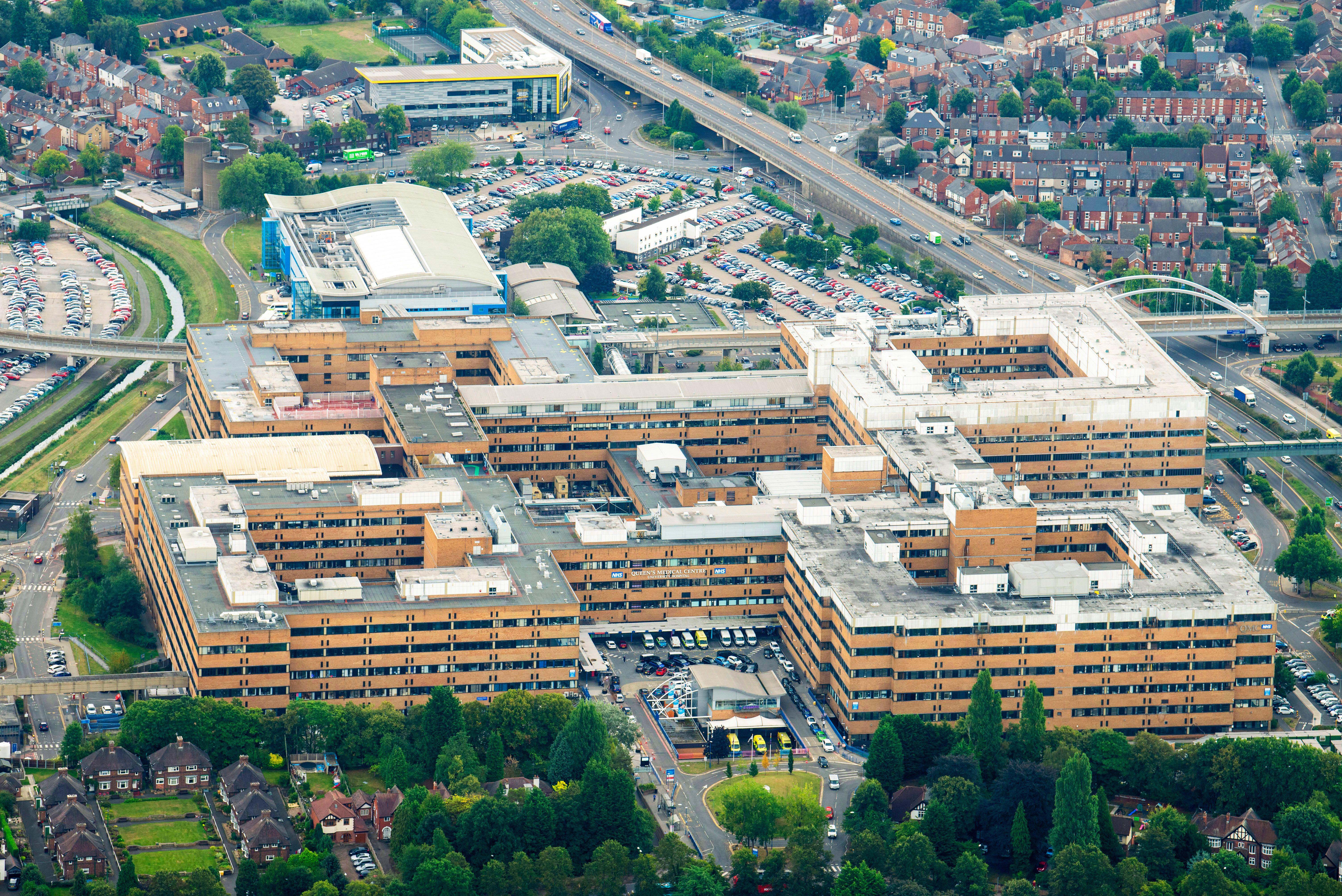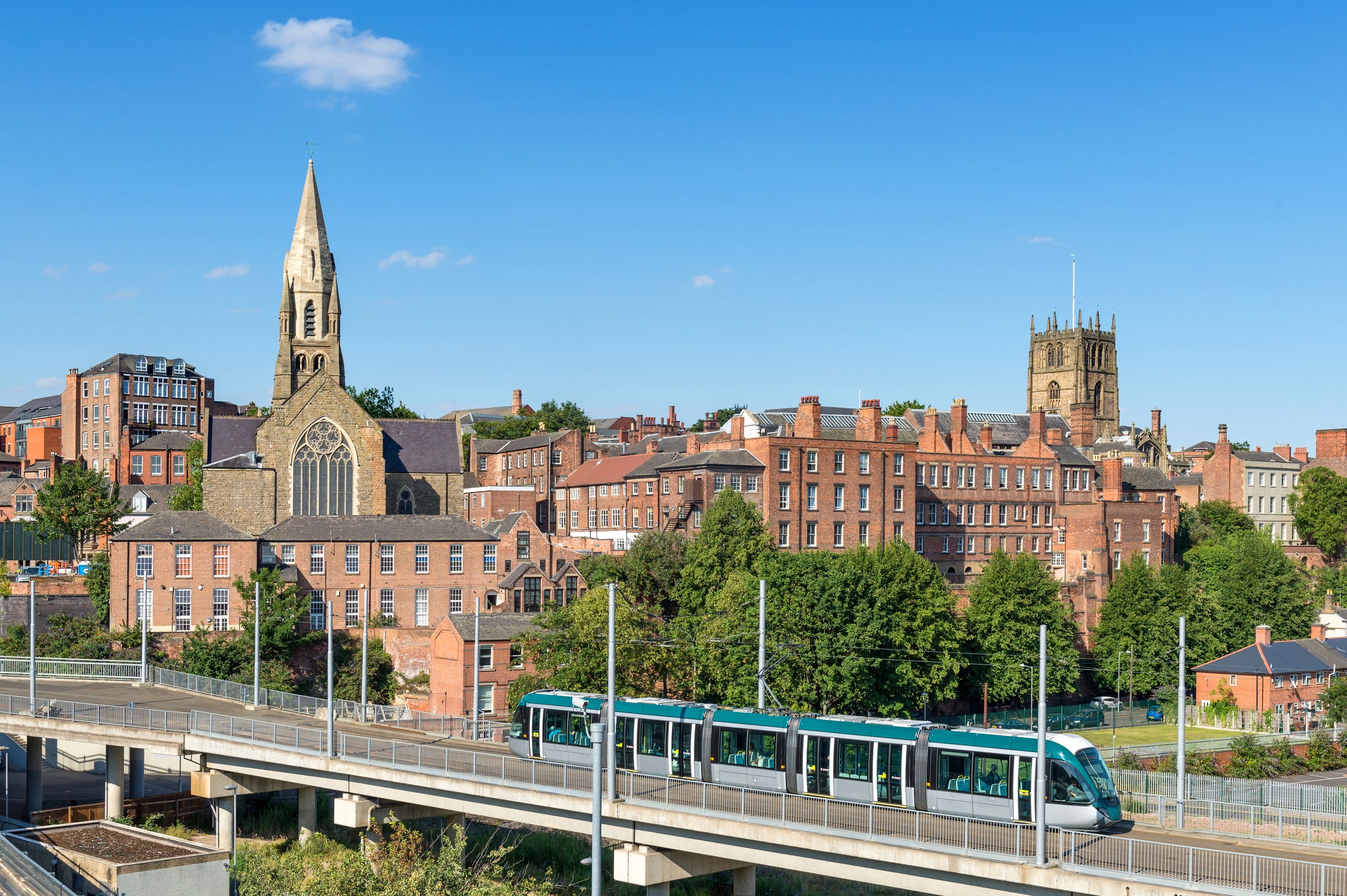‘Cost of living? It’s the cost of just surviving more like’
Costs are spiralling and government ministers are proposing further spending cuts and pay restraint, in a country where the effects of austerity are still obvious. Peter Blackburn investigates the impact of budget cuts and squeezed finances on the health of communities in Nottingham

Garry Lovelock is not a religious man. But when the lonely nights sleeping on the streets, the “grubby” washing in McDonald’s toilets and the endless fines for boarding trains without a ticket become too much he finds himself in church, praying – just hoping for “a helping hand”.
The other likely destination on those hopeless nights is the accident and emergency department at Nottingham’s Queen’s Medical Centre. Lovelock, 41, lost his house and employment after his wife died of leukaemia. When he is emotional and upset he drinks. It is the causal spark of a repetitive cycle in which he is picked up by the police, taken to A&E, sees a doctor after sobering up and is told he is fit to go. Not go home, of course. But go. It is a costly cycle with the average interaction with A&E estimated at £297 by the NHS, not to mention the serious mental and physical toll this repetition has on Lovelock, too.
“There is so much of that – not addressing the root causes and just using sticking plasters [like seeing a doctor in A&E],” says Ann Bremner, who runs The Friary homelessness charity in West Bridgford, Nottingham, where Lovelock has been provided a meal and support in his search for employment.
At The Friary there are scores of people trapped in such a cycle within the health or criminal justice systems. On the day of visiting, a man is slumped outside the front door – knocked out due to heavy use of the synthetic cannabinoid mamba, also known as spice. He had been in and out of A&E, crisis teams have been involved but because he has no home, the authorities say there is no safe place for them to conduct a mental health assessment. Instead, he is repeatedly charged with offences, offered no intervention, and continues to use drugs.
The ONS (Office for National Statistics) recently published a health index, which scores the health of each part of the country based on a vast analysis of prevalence of conditions, access to services and living conditions. Nottingham is sixth worst out of 340. In some of its most deprived areas, life expectancy is on the decline – a trend not seen in more than a century.
Much of the regression, nationally and locally, is being caused by preventable illness. Relative to comparable countries, the UK has a higher amount of preventable illness, and those numbers are rising. An estimated 29 million people in the UK are living with one or more long-term health conditions. The number of working-age people in Britain reporting multiple serious health conditions has rocketed by 735,000 in just two years. These figures are often worst in the most deprived communities
The evidence suggests this deterioration in health is driven by austerity politics – political and economic decisions taken by successive governments. Billions of pounds have been cut from public services and social security since 2010, decimating welfare and the social safety net and there are now far fewer services promoting good health. According to estimates from the Glasgow Centre for Population Health an additional 335,000 deaths have been caused by austerity in the five years before the pandemic – more than from the first two and a half years of Covid-19.
Cuts to central government funding for local government have meant cuts to public services that are essential to health – including housing, transport, children’s services, leisure and public health.
For example, spending on housing services and homelessness prevention in England declined by 50 per cent between 2009 and 2019. Street homelessness rose rapidly during this time, doubling between 2013 and 2018. The number of homeless people dying also increased during these years.
The loss of Sure Start programmes has had a big impact in this city. Spending on the programme declined from £1.8bn in 2010 to £600m by 2017-18, resulting in over 1,000 Sure Start centre closures nationally. These closures came despite an IFS evaluation which revealed positive health impacts, including 5,000 fewer hospital admissions of 11-year-olds each year for children who participated, benefitting disadvantaged children the most.

This sort of neglect has hit hard across the country, but few harder than in St Ann’s – a particularly deprived part of Nottingham which has a history of knife and gun crime. According to the 2019 ward health profile, 37 per cent of adults in this corner of the city smoke, 46 per cent of children in year six are overweight or obese and 38 per cent of children aged zero to 15 years live in poverty.
St Ann’s sits right on the edge of Nottingham city centre but retains a distinct sense of independence and isolation. In the 1960s the Victorian terraces here were knocked down as part of “slum clearances” and replaced with a mazy prefabricated estate. Just 50 years later this area feels impenetrable and cut off. The shops at the precinct off the area’s Robin Hood Chase are boarded up and empty. There are precious few signs of life.
Just one door stands ajar on the precinct. A dimly glowing light fleetingly escaping out into the pedestrianised courtyard, which the abandoned buildings share. Inside, staff are stacking tins, packets and vital supplies on shelving units which surround the rooms and corridors within the makeshift foodbank.
It is part of The Chase Neighbourhood Centre – a local charitable success story, which has been supporting people in this deprived community since 1997. Debbie Webster, manager of the centre, is something of a local hero having been involved in the local community since setting up a community group during the difficult 1980s in Thatcher’s Britain. It started in the pub across the road and now there are 32 paid staff in a purpose-built community hub “delivering support to people in crisis”.
“Sometimes I feel quite pleased, but I wish we didn’t have to have any [staff]," Webster says. "What a sign of the times that is.”
Here at The Chase, every opportunity is taken to wrap care and services around people who need help. There are money advice staff, benefits advisors, digital support and language classes available, among many other things.
“It’s a real struggle, you just have to try to survive,’ says one client, a mother in her early thirties. ‘It all makes me wonder what the world is going to be like for my daughter.”
Few links between austerity and health are more obvious than in the cuts to the public health grant. With public health moved to local authorities from the NHS in 2012, due to the Health and Social Care Act, budgets were under even more threat than those in the health service. This has also had the effect of creating silos and fragmenting services. “It has made a big impact in what we can do as doctors,” says Nottingham consultant psychiatrist David Rhinds. “Before those changes I could see a patient in a clinic, prescribe for them, order investigations and scans and all that sort of thing.” Now, few of those options are open to Dr Rhinds.
Jane Bethea, consultant in public health, adds: “The function of public health was fractured terribly and we’re trying to get that back now – but we’ve got such low capacity… Frontline public health is under massive pressure.”

The public health grant has been cut by 24 per cent since 2015/16. Within those cuts stop smoking and tobacco control projects have been cut by 41 per cent, drug and alcohol services by 28 per cent and sexual health services by 23 per cent. “You can see that we are actually bucking the trend in Nottingham now, in that smoking prevalence is increasing,” Dr Bethea says. Cuts have been higher in deprived areas like Nottingham. And those cuts come despite public health interventions being known to provide value for money: each year of good health achieved costs £3,800, compared to over £13,500 if things are left until they require NHS intervention. Another familiar theme is that every budget cut seems to end up just costing far more down the line.
“Some of these people I have been seeing for 10 years now,” says Nottingham GP Stephen Willott, sitting in his consultation room at The Windmill GP Practice in Sneinton, just east of Nottingham city centre. The practice runs one of the biggest shared care drug clinics in the East Midlands.
I see a patient whose leg is so swollen the doctor’s fingers leave deep impressions in the flesh when making an assessment. He appears to be in a slight daze and says he has just had some mamba. Asked how he is finding life, he says: “It is just getting harder.”
For some people in this city using mamba is the easiest method of escapism. Mamba, in comparison to many drugs, is relatively cheap and it will remove users from full consciousness for a period of time, but Dr Willott says it is largely a “pleasureless” drug where users are just “out of it”. This, many health professionals say, is among the most depressing indictments on the state of society – that escapism without any pleasure is desired.
After working through patients unable to come to the surgery in person and others seeking prescriptions, a homeless patient who is at his wits’ end, having been unable to satisfy any landlords that he could pay their rents with the benefits available to him. He says: “I’ve given up. It’s a waste of time. The only time I will get help is when something really bad happens. Everywhere I go, nobody is interested. Maybe they will be when I’m dead.”
A final patient for the day arrives. He is happy to talk but is not well. He can’t lift his arm, he has an abscess on one of his legs and half of his jaw has rotted away. He has just two teeth left. The patient’s brother died recently after taking mamba. After three years on the streets, he now has a flat and found services were more supportive following the death of his brother. Asked about the future, he says: “Life is very tough. Cost of living? It’s the cost of just surviving, more like.”
Dr Willott, who is chair of the local drug deaths group, describes the situation as “increasingly brutal with each successive year”, but many are not fortunate enough to access services like his. He says a half of drug deaths each year nationally are of patients who are not in any treatment whatsoever, and that there is a crisis in people not being engaged with services.
Last year, 4.5 million UK households were fuel-poor and the National Energy Action, a charity which campaigns for everyone to have a warm home, is warning that fuel poverty numbers will rise to 6.7 million this winter. Households with children have the highest prevalence of fuel poverty and respiratory illnesses are more than twice as high among children who live in cold, damp homes.

In September, 18 per cent – 9.7 million adults – of all households were food insecure, meaning they ate less or went a day without eating because they couldn’t access or afford. This has more than doubled since January. And one in four households with children have experienced food insecurity in the past month, affecting an estimated 4 million children. This food insecurity is known to lead to adverse health outcomes – causing both malnutrition and obesity.
At The Chase, advisor and community engagement worker Rachel Graham says the need is so severe now that the centre is overwhelmed, and staff often have to direct people to Citizens’ Advice instead. “We anticipate this winter being a scary time - that question, heat or eat, will become an increasing issue,” she says.
Austerity, and the inequalities it has driven, have a huge impact on the NHS. There is currently a record number of more than 7 million people waiting for treatment, including 2.75 million patients waiting over 18 weeks. Last year, waiting lists increased by more than half, 55 per cent, in the most deprived areas, compared to a third in the least.
The cost of living crisis is also likely to lead to a rise in demand for emergency and mental health care over the coming winter.
It is not just the most obvious links between austerity and health that are causing great strain, though. Bob Winter, former medical director for the East Midlands Ambulance Service, national clinical director for critical care and clinical lead in the emergency department at Nottingham’s QMC, says: “There’s not the safety net and there’s a disengagement of society that didn’t exist before. We are seeing younger and younger people involved in violent crime. If you had told me 10 years ago that we would be teaching nightclub doormen and McDonald’s staff how to manage a life-threatening haemorrhage, I wouldn’t have believed you… I would have laughed in your face. But that is where we are.”
On top of that, the NHS workforce is depleted and exhausted by more than a decade of working in under-resourced environments, with punitive pension taxes hanging over them and the ever-increasing risks of corridor medicine with patients locked in hospital due to a spiralling crisis in social care.
Professor Martin McKee, the president of the British Medical Association (BMA), says: “British doctors are tired. But it’s not just the long hours and heavy workloads. They are tired of picking up the pieces after government ministers whose policies are harming health and placing our NHS under unsustainable pressure. And now, as ministers seek to balance the books, we face the return to the failed policies of austerity that created many of the problems we face today.”
The BMA is calling on the government to take urgent action to halt the decline in the country’s health. Its proposals include upholding commitments to uprating benefits in line with inflation, exploring reforms to social security and wages to ensure both guarantee everyone access to the income they need to stay healthy and well and a commitment to uprating budgets so public services can cope with inflation.
Back at the Friary, Garry Lovelock tells a joke: “Why did George Michael have chocolate all over his face? Because he was careless with his Wispa.”
Lovelock remains an optimist, who tries to “pick people up when they are down”. After more than a decade of austerity, communities in Nottingham are asking when, if ever, the government will be minded to do the same.
Peter Blackburn is a senior staff writer at ‘The Doctor’, the British Medical Association’s magazine for members. A longer version of this feature can be found on the BMA website





Join our commenting forum
Join thought-provoking conversations, follow other Independent readers and see their replies
0Comments